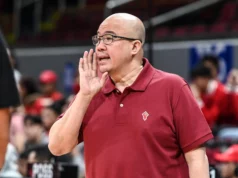The pressure was evident from the moment the Sparks announced the appointment of Derek Fisher as their head coach for the 2019 season. Christmas was just three weeks away, and yet members of the media didn’t seem to be in a giving mood. They peppered him, general manager Penny Toler, and star Candace Parker with queries on the hiring process and his capacity to meet always-outsized expectations of the proud franchise and its demanding fan base conditioned to consider success as coming with the territory. And they had reason to; after all, the purple and gold boast of three WNBA championships off five Finals appearances in 17 postseason berths.
Put simply, the Sparks are projected to contend for the hardware year in and year out. Which was why a coaching vacancy occurred in the first place. Fourth-year mentor Brian Agler, whose otherwise-stellar record included the singular distinction of having claimed titles with two different franchises, had to step down following a rocky 19-15 season and a second round exit last year. Naturally, a “search” for his successor followed — never mind that it involved exactly one name, leading to even more heat accompanying Fisher’s assumption of the position.
To be fair, the Sparks had a right to hire whomever they wanted, and Fisher wasn’t exactly without experience in mentoring under the klieg lights. He certainly did well to steer them to a three-game regular-season improvement year on year despite the injuries that plagued them. That said, the final outcome is all that matters; so-called moral victories count for squat in La-La Land. And even if they were predisposed to look for silver linings, doing so given the way the campaign ended would have smacked of desperation. There’s just no going around the shellacking they absorbed at the hands of the Sun.
Perhaps the scrutiny in the aftermath wouldn’t have been intense were the Sparks at least able to make a series out of their semifinal-round stint. Instead, they stank up the joint. They weren’t merely swept; they lost by nine, 26, and 22, exposed from the get-go as ridiculously overmatched on the court and in the sidelines. In fact, so disjointed were they that Fisher saw fit to bench his starters in the fourth quarter of the final contest — a bad look all around. Parker herself saw action for only 11 minutes and 14 seconds, and it’s telling that she will be remembered more for muttering “Why would you do that now?” to her coach as she rode the pine than for her Game One gem of 24, 10, three, two, and six.
Parker was still distraught in the locker room after the Game Three debacle, insisting that she was primed to play physically and mentally, and that Fisher would be in better position to explain why she burned rubber for less time than all but two players on the team. He did, or at least he tried to, disclosing that he was looking to inject energy for the Sparks. Well, it didn’t work, as the lead grew even more. And, if nothing else, his unconventional — okay, decidedly bizarre — moves will be second-guessed as a result. As ineffective as she may have been to him, she remains the face of the franchise, and arguably the league’s biggest name considering her sideline as analyst for Turner Sports.
How the turn of events affects the relationship between Fisher and Parker, which went beyond work, remains to be seen. If the Sparks are to make the sort of headway they believe they’re destined to, however, bench tactician and marquee name must see eye to eye. A lot of mediating looks to be in the offing. A long offseason lies ahead.
Anthony L. Cuaycong has been writing Courtside since BusinessWorld introduced a Sports section in 1994. He is a consultant on strategic planning, operations and Human Resources management, corporate communications, and business development.



